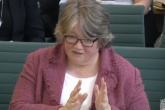Defra bullish on 25-year plan amid rumours of troubled development
Defra says that it is ‘committed’ to publishing its long-term environmental plan after a leaked draft of the long-awaited document was criticised by environmental groups amid rumours it may never see the light of day.
The resources industry has been awaiting the 25-year plan for over a year, with ministers promising repeatedly that it will establish long-term priorities for the department following a virtual silence on waste policy.
However, reporting on a leaked version of the plan this morning (11 April), the BBC says that it lacks policies and practical solutions. The broadcaster also reports that sources have suggested that the plan might not be published until the autumn, with others wondering whether it will ever be released at all.
A five-year plan released last February ahead of the longer-term policy document gained the ire of the waste and resources industry after it mentioned resources only once in the form of developing new approaches to combat waste crime.
Amid fears that waste is perpetually stationed towards the bottom of Defra’s list of priorities, the industry was assured that greater focus would be given to waste in the 25-year plan, but delays following the vote to leave the EU and a reshuffle of environment ministers following Theresa May’s arrival as Prime Minister means that indication of the government’s proposed polices has yet to be seen.
Plan notes Brexit’s role in deciding waste and resources policy
Hopes for a greater acknowledgement for national strategy on waste may be aided by reports that the plan contains references to Brexit providing an opportunity for the UK to decide its own rules on waste and resources, with BBC analysis suggesting that ministers will want to simplify environmental rules and prioritise carrots over sticks for businesses that break laws.
Among the goals suggested in the 46-page document is the desire to ‘incorporate evidence on the value of nature into the Treasury’s advisory ‘green book’, so the environment into all government decisions’, reflecting criticism of the Treasury from Parliament’s Environmental Audit Committee for putting short-term priorities over long-term sustainability.
However, the BBC quotes environmental groups as saying that the plan features ‘good thinking on the framework for environmental management’ but is ‘lacking in practical solutions’.
According to the BBC, the draft plan sets out several priorities with the overall aim of ‘ensuring England's environment is healthy and that it is a beautiful place to live, work and bring up a family’. These include:
- Our water will be cleaner and healthier;
- Our plants and wildlife will be healthier and our habitats better managed;
- Our air will be of better quality;
- Our seas will be cleaner;
- Our country will use resources more efficiently; and
- Our country will develop a low carbon economy.
Defra ‘working closely’ with environmental groups
Responding to the reports, a Defra spokesperson said: “Our ambition is to be the first generation to leave the environment in a better state than we found it, and we are committed to publishing a long-term plan that builds on our long history of wildlife and environmental protection, and sets out a new approach to managing the environment.
“We want everyone to have a say on building polices that enable our environment to thrive, which is why we’re working closely with a range of environmental and conservation groups and businesses to develop proposals.”
Regarding the delay to publication, the spokesperson explained that the result of last June’s referendum meant Defra ‘needed to take stock and consider our long-term approach to managing the environment’.
The initial response to the referendum result included worries that long-term uncertainty would hinder the development of waste infrastructure and harm the waste industry, and it was hoped the plan would return some of that certainty with an idea of how the government saw its waste policy progressing.
Defra says that since the EU vote, it has been ‘working closely’ with a range of environmental and conservation groups and businesses to develop initial proposals, which will form the basis of its wider engagement. The Great Repeal Bill, introduced last month, is to ensure that EU environmental law applies following Brexit, providing what Defra says is certainty for stakeholders and businesses and the opportunity to ensure the UK’s legislative framework delivers its goals of an improved environment.







